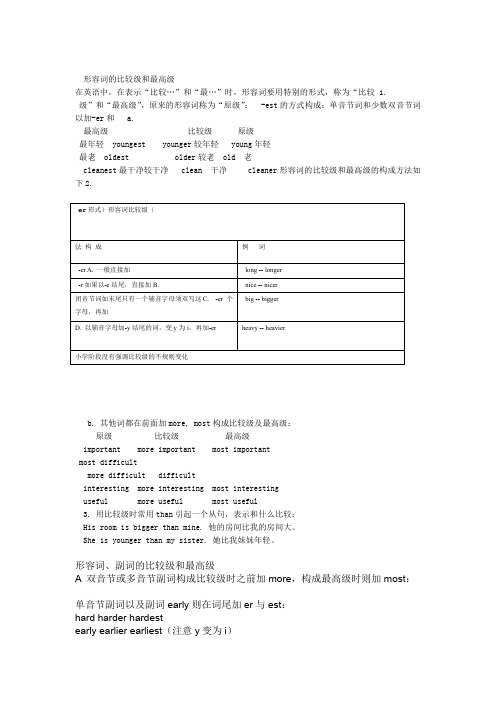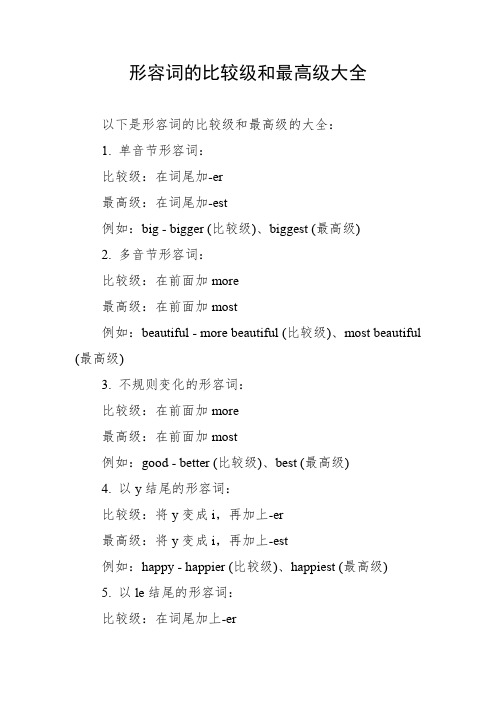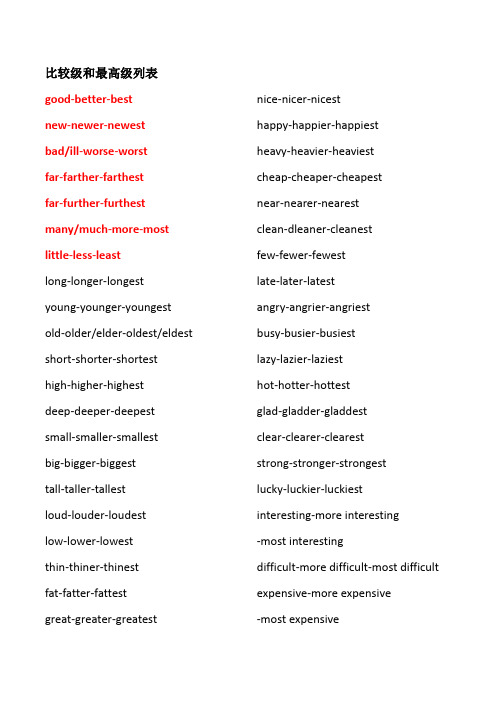比较级和最高级列表
完整小学英语比较级和最高级

形容词的比较级和最高级在英语中,在表示“比较…”和“最…”时,形容词要用特别的形式,称为“比较 1.级”和“最高级”,原来的形容词称为“原级”: -est的方式构成:单音节词和少数双音节词以加-er和 a.最高级比较级原级最年轻 youngest younger较年轻 young年轻最老 oldest older较老 old 老cleanest最干净较干净 clean 干净 cleaner形容词的比较级和最高级的构成方法如下2.b. 其他词都在前面加more, most构成比较级及最高级:原级比较级最高级important more important most importantmost difficultmore difficult difficultinteresting more interesting most interestinguseful more useful most useful3. 用比较级时常用than引起一个从句,表示和什么比较:His room is bigger than mine. 他的房间比我的房间大。
She is younger than my sister. 她比我妹妹年轻。
形容词、副词的比较级和最高级A 双音节或多音节副词构成比较级时之前加more,构成最高级时则加most:单音节副词以及副词early则在词尾加er与est:hard harder hardestearly earlier earliest(注意y变为i)B 不规则变化:well better bestbadly worse worstlittle less leastmuch more mostfar farther farthest(仅用于指距离)further furthest.much,more,mostA more和most的用法相当自由:You should ride more.你必须多骑马。
英语中的比较级和最高级

英语中的比较级和最高级比较级和最高级是英语中用来对比两个或多个事物在特定品质或性质上的程度的语法结构。
在英语中,比较级和最高级分别用于形容词和副词的比较。
形容词的比较级和最高级比较级形容词的比较级用于比较两个事物在某种特定品质上的程度。
比较级的形式通常在形容词词尾加上 -er,或在前面加上 more。
例如:- old(年长的)→ older(更年长的)- beautiful(美丽的)→ more beautiful(更美丽的)最高级形容词的最高级用于比较三个或更多事物在某种特定品质上的程度,表示最高程度。
最高级的形式通常在形容词词尾加上 -est,或在前面加上 most。
例如:- old(年长的)→ oldest(最年长的)- beautiful(美丽的)→ most beautiful(最美丽的)副词的比较级和最高级比较级副词的比较级用于比较两个动作或状态在某种特定品质上的程度。
比较级的形式通常在副词词尾加上 -er,或在前面加上 more。
例如:- quickly(迅速地)→ more quickly(更迅速地)- slowly(慢慢地)→ slower(更慢慢地)最高级副词的最高级用于比较三个或更多动作或状态在某种特定品质上的程度,表示最高程度。
最高级的形式通常在副词词尾加上-est,或在前面加上 most。
例如:- quickly(迅速地)→ most quickly(最迅速地)- slowly(慢慢地)→ slowest(最慢慢地)以比较级和最高级来表达程度的变化在英语中非常常见,它们可以帮助我们更准确地描述事物之间的差异和特点。
在使用比较级和最高级时,需要注意形容词和副词的不规则变化形式,并且要根据上下文来判断使用哪种形式。
以上是关于英语中比较级和最高级的简要介绍。
比较级(完整版)

比较级(完整版)XXXXXXXXXXXXthe worst形容词比较级和最高级形容词比较级和最高级用于描述物品、人或事物的大小、高度、强度、重量、年龄、智力等方面的差异。
下面是一些常用的形容词比较级和最高级。
原级快的 - fast高的 - XXX强 - strong高的 - high大的 - big胖的 - fat长的 - long重 - heavy干燥 - dry热的 - hot温暖 - warm年轻 - young懒惰 - lazy早的 - early美 - pretty好的 - nice许多 - many/much 比较级更快的 - faster更高的 - XXX更强的 - stronger 更高的 - higher更大的 - bigger更胖的 - fatter更长的 - longer更重的 - XXX更干燥的 - XXX 更热的 - hotter更温暖的 - warmer 更年轻的 - younger 更懒惰的 - lazier 更早的 - XXX更美的 - XXX更好的 - nicer更多的 - more更近的 - nearer更少的 - less更好的 - better最高级最快的 - the fastest最高的 - XXX最强的 - the strongest 最高的 - XXX最大的 - the biggest最胖的 - the fattest最长的 - the longest最重的 - XXX最干燥的 - XXX最热的 - the hottest最温暖的 - the warmest 最年轻的 - the youngest 最懒惰的 - the laziest 最早的 - XXX最美的 - the prettiest最好的 - the nicest最多的 - the most最近的 - the nearest最少的 - least最好的 - the best除此之外,还有一些其他的形容词比较级和最高级,比如慢的 - slow,短的 - short,虚弱的 - weak,低的 - low,小的 - small,瘦的 - thin,宽的 - wide,轻的 - light,潮湿的 - wet,寒冷的 - cold,凉的 - cool,老的 - old,聪明的 - smart,晚的 - late,聪明的 - clever,可爱的 - cute,深入的 - further/farther,远的 - far,少的 - few,坏的 - worse。
形容词的比较级和最高级大全

形容词的比较级和最高级大全以下是形容词的比较级和最高级的大全:1. 单音节形容词:比较级:在词尾加-er最高级:在词尾加-est例如:big - bigger (比较级)、biggest (最高级)2. 多音节形容词:比较级:在前面加more最高级:在前面加most例如:beautiful - more beautiful (比较级)、most beautiful (最高级)3. 不规则变化的形容词:比较级:在前面加more最高级:在前面加most例如:good - better (比较级)、best (最高级)4. 以y结尾的形容词:比较级:将y变成i,再加上-er最高级:将y变成i,再加上-est例如:happy - happier (比较级)、happiest (最高级)5. 以le结尾的形容词:比较级:在词尾加上-er最高级:在词尾加上-est例如:possible - more possible (比较级)、most possible (最高级)6. 少数不规则变化的形容词:比较级:在前面加more最高级:在前面加most例如:famous - more famous (比较级)、most famous (最高级)7. 特殊的比较级和最高级:例如:well - better (比较级)、best (最高级)8. 副词的比较级和最高级:比较级:在后面加-er最高级:在后面加-est例如:slowly - more slowly (比较级)、most slowly (最高级)以上是常见的形容词的比较级和最高级,但是也有一些不规则变化的形容词需要记忆。
同时,需要注意的是,有些形容词没有比较级和最高级,如unique。
完整)小学英语常见形容词及比较级、最高级变化一览表

完整)小学英语常见形容词及比较级、最高级变化一览表小学英语常见形容词及比较级、最高级变化一览表1.在形容词词尾加上“er”“est”构成比较级、最高级:bright(明亮的)—brighter—brightestyoung(年轻的)—younger—youngestcheap(便宜的)—cheaper—cheapestclean (干净的)—cleaner—cleanestclever(聪明的)—cleverer—cleverestcold(寒冷的)—colder—coldestcool(凉的)—cooler—coolestdark(黑暗的)—darker—darkestdeep(深的)—deeper—arm(温暖的)—warmer—warmestfast(迅速的)—faster—fastestfew(少的)—fewer—fewestgreat(伟大的)—greater—greatesthard(困难的,硬的)—harder—hardesthigh (高的)—higher—highestkind(善良的)—kinder—kindestlight(轻的)—lighter—lightestlong(长的)—longer—longestloud(响亮的)—louder—loudestlow(低的)—lower—lowestnear(近的)—nearer—nearestnew(新的)—newer—newestpoor(穷的)—poorer—poorestquick(快的)—quicker—quickestquiet(安静的)—quieter—quietestrich(富裕的)—richer—richestshort(短的)—shorter—shortestslow(慢的)—slower—slowestsmall(小的)—smaller—smallestsmart(聪明的)—smarter—smarteststrong(强壮的)—stronger—eak(弱的)—weaker—weakestsweet(甜的)—sweeter—XXX (高的)-taller-tallestthick(厚的)—thicker—thickest2.双写末了一个字母,再加上“er”“est”组成比力级、第一流:big(大的)—bigger—biggestfat(胖的)—fatter—fattesthot(热的)—hotter—et(湿的)—wetter—XXX(瘦的)—thinner—thinnest3.以不发音的字母e末端的描述词,加上“r”“st”组成比力级、第一流:close(靠近的)—closer—closestfine(好的,圆满的)—finer—finestlarge(宏大的)—larger—largestlate(迟的)—later—latestnice(好的)—nicer—nicestsafe(平安的)—safer—safeststrange(奇特的)—stranger—ide(宽阔的)—wider—widest4.以字母y末端的描述词,把y改成i,再加上“er”“est”组成比力级、第一流:busy(繁忙的)—busier—busiestdirty(脏的)—dirtier—dirtiestdry(枯燥的)—drier—driestearly(早的)—earlier—earliesteasy(简单的)—XXX—easiestfriendly(友爱的)—XXX(好玩的)—funnier—XXX (高兴的)—happier—XXX(安康的)—XXX—XXX(重的)—heavier—heaviest1hungry(饿的)—hungrier—hungriestlazy(懒惰的)—lazier—laziestlucky(幸运的)—luckier—luckiestugly(丑的)—uglier—ugliestnoisy(嘈杂的)—noisier—noisiestpretty(美丽的)—prettier—prettiestsilly(傻的)—sillier—silliestthirsty (渴的)—thirstier—thirstiest5.双音节、多音节形容词,在单词前面加上“more”“most”构成比较级、最高级:afraid(害怕的)—more afraid—most afraidbeautiful(美丽的)—more beautiful—most beautifulcareful(仔细的)—more careful—most carefuldangerous(危险的)—more dangerous—most dangerousus(鲜味的)—more us—most usdifficult(艰巨的)—more difficult—most difficultexciting(令人兴奋的)—XXXXXX(昂贵的)—more XXXfamous(有名的)—more famous—most famoushard-working(用功的)—more hard-working—most hard-workingXXX(有帮助的)—more XXXhonest(诚实的)—XXXimportant(重要的)—XXXinteresting(有趣的)—more interesting—most interesting polite(有规矩的)—more polite—most politeterrible(恐怖的)—more XXXtired(累的)—more tired—most tired6.不划定规矩变革的描述词:bad(坏的)—worse—worstfar(远的)—farther—farthest (far—further—furthest) good(好的)—better—XXXill(病的)—worse—worstlittle(少的)—less—leastmany(多的)—more—mostmuch(多的)—more—mostold(大哥的)—older—oldest ( old—elder—eldest)well(好的,身材好的)—better—best。
英语常见形容词及比较级、最高级变化一览表

英语常见形容词及比较级、最高级变化一览表比较级、最高级变化一览表规则变化1. 单音节以及少数双音节的词尾加上“er” “est” 构成比较级、最高级:bright(明亮的)—brighter—brightestbroad(广阔的)—broader—broadestcheap(便宜的)—cheaper—cheapestclean(干净的)—cleaner—cleanestclever(聪明的)—cleverer—cleverestcold(寒冷的)—colder—coldestcool(凉的)—cooler—coolestdark(黑暗的)—darker—darkestdear(贵的)—dearer—dearestdeep(深的)—deeper—deepestfast(迅速的)—faster—fastestfew(少的)—fewer—fewestgreat(伟大的)—greater—greatesthard(困难的,硬的)—harder—hardesthigh(高的)—higher—highestkind(善良的)—kinder—kindestlight(轻的)—lighter—lightestlong(长的)—longer—longestloud(响亮的)—louder—loudestlow(低的)—lower—lowestnear(近的)—nearer—nearestnew(新的)—newer—newestpoor(穷的)—poorer—poorestquick(快的)—quicker—quickestquiet(安静的)—quieter—quietestrich(富裕的)—richer—richestshort(短的)—shorter—shortestslow(慢的)—slower—slowestsmall(小的)—smaller—smallestsmart(聪明的)—smarter—smartestsoft(柔软的)—softer—softeststrong(强壮的)—stronger—strongestsweet(甜的)—sweeter—sweetesttall(高的)-taller - tallestthick(厚的)—thicker—thickestwarm(温暖的)—warmer—warmestweak(弱的)—weaker—weakestyoung(年轻的)—younger—youngest2以一个元音加一个辅音字母结尾的单音节词(即重读闭音节词),双写结尾的辅音字母er,-estbig(大的)—bigger—biggestfat(胖的)—fatter—fattesthot(热的)—hotter—hottestred(红的)—redder—reddestsad(伤心的)—sadder—saddestthin(瘦的)—thinner—thinnestwet(湿的)—wetter—wettestmad(疯的)—madder—maddest特别提醒:new, few, slow, clean等词含有字母组合,且发的是长元音,不用双写。
(完整版)比较级和最高级列表

比较级和最高级列表good-better-bestnew-newer-newestbad/ill-worse-worstfar-farther-farthestfar-further-furthestmany/much-more-most little-less-leastlong-longer-longestyoung-younger-youngest old-older/elder-oldest/eldest short-shorter-shortesthigh-higher-highestdeep-deeper-deepestsmall-smaller-smallestbig-bigger-biggesttall-taller-tallestloud-louder-loudestlow-lower-lowestthin-thiner-thinestfat-fatter-fattestgreat-greater-greatest nice-nicer-nicesthappy-happier-happiestheavy-heavier-heaviestcheap-cheaper-cheapestnear-nearer-nearestclean-dleaner-cleanestfew-fewer-fewestlate-later-latestangry-angrier-angriestbusy-busier-busiestlazy-lazier-laziesthot-hotter-hottestglad-gladder-gladdestclear-clearer-cleareststrong-stronger-strongestlucky-luckier-luckiestinteresting-more interesting-most interestingdifficult-more difficult-most difficult expensive-more expensive-most expensive形容词比较级、最高级的构成一、规则变化1. 单音节词和少数双音节词(1)一般情况在原级词尾加-er构成比较级,加-est构成最高级。
(完整版)比较级和最高级

(完整版)比较级和最高级一、形容词的比较级和最高级变化规则;1、规则变化:(1) 单音节词和少数双音节词一般在词尾加er或est:如: small ---smaller --- the smallest(2) 以不发音的e字母结尾的加r,或st:如: late --- later --- the latest(3) 以辅音字母加y结尾的变y为I加er或est:如: easy --- easier --- the easiest(4)以一个辅音字母结尾的重读闭音节词双写最后一个辅音字母再加er或est:如: big --- bigger --- the biggest以er,ow结尾的双音节词加er 或est如: slow --- slower --- the slowest(5) 多音节词前加more或most, 副词最高级前省略the.如: important --- more important --- the most important2.不规则变化good / well --- better --- the best 好bad / badly / ill --- worse --- the worst 坏many / much --- more --- the most 多little --- less --- the least 少old --- older / elder --- the oldest / the oldest 老, 旧far --- farther / further --- the farthest / the furthest 远常见形容词比较级、最高级变化一览表1.在形容词词尾加上“er”“est”构成比较级、最高级:bright(明亮的)—brighter—brightest broad(广阔的)—broader—broadest cheap(便宜的)—cheaper—cheapest clean (干净的)—cleaner—cleanestclever(聪明的)—cleverer—cleverest cold(寒冷的)—colder—coldest cool(凉的)—cooler—coolest dark(黑暗的)—darker—darkest deep(深的)—deeper—deepest fast(迅速的)—faster—fastestfew(少的)—fewer—fewest great(伟大的)—greater—greatest hard(困难的,硬的)—harder—hardest high(高的)—higher—highest kind(善良的)—kinder—kindest light(轻的)—lighter—lightest long(长的)—longer—longest loud(响亮的)—louder—loudestlow(低的)—lower—lowest near(近的)—nearer—nearest new(新的)—newer—newest poor(穷的)—poorer—poorestquick(快的)—quicker—quickest quiet(安静的)—quieter—quietestrich(富裕的)—richer—richest short(短的)—shorter—shortestslow(慢的)—slower—slowest small(小的)—smaller—smallest smart(聪明的)—smarter—smartest soft(柔软的)—softer—softest strong(强壮的)—stronger—strongest sweet (甜的)—sweeter—sweetest tall(高的)-taller-tallest thick(厚的)—thicker—thickest warm(温暖的)—warmer—warmest weak(弱的)—weaker—weakest young(年轻的)—younger—youngest2.双写最后一个字母,再加上“er”“est”构成比较级、最高级:big(大的)—bigger—biggest fat(胖的)—fatter—fattesthot(热的)—hotter—hottest red(红的)—redder—reddestsad(伤心的)—sadder—saddest thin(瘦的)—thinner—thinnestwet(湿的)—wetter—wettest mad(疯的)—madder—maddest3.以不发音的字母e结尾的形容词,加上“r”“st”构成比较级、最高级:able(能干的)—abler—ablest brave(勇敢的)—braver—bravest close(接近的)—closer—closest fine(好的,完美的)—finer—finest large(巨大的)—larger—largest late(迟的)—later—latestnice(好的)—nicer—nicest ripe(成熟的)—riper—ripestrude(粗鲁的)—ruder—rudest safe(安全的)—safer—safest strange(奇怪的)—stranger—strangest wide(宽广的)—wider—widest wise(睿智的,聪明的)—wiser—wisest white(白的)—whiter—whitest4.以字母y结尾的形容词,把y改为i,再加上“er”“est”构成比较级、最高级:busy(忙碌的)—busier—busiest dirty(脏的)—dirtier—dirtiest dry(干燥的)—drier—driest early(早的)—earlier—earliest easy(容易的)—easier—easiest friendly(友好的)—friendlier—friendliest funny(好玩的)—funnier—funniest happy(开心的)—happier—happiest healthy(健康的)—healthier—healthiest heavy(重的)—heavier—heaviest hungry(饿的)—hungrier—hungriest lazy(懒惰的)—lazier—laziestlucky(幸运的)—luckier—luckiest naughty(调皮的)—naughtier—naughtiest noisy(嘈杂的)—noisier—noisiest pretty (美丽的)—prettier—prettiest silly(傻的)—sillier—silliest spicy(辣的)—spicier—spiciestthirsty(渴的)—thirstier—thirstiest ugly(丑的)—uglier—ugliest4.双音节、多音节形容词,在单词前面加上“more”“most”构成比较级、最高级:afraid(害怕的)—more afraid—most afraidbeautiful(美丽的)—more beautiful—most beautifulcareful(仔细的)—more careful—most carefulcheerful(开心的)—more cheerful—most cheerfulcrowded(拥挤的)—more crowded—most crowdeddangerous(危险的)—more dangerous—most dangerous delicious(美味的)—more delicious—most deliciousdifficult(困难的)—more difficult—most difficultexciting(令人兴奋的)—more exciting—most excitingexpensive(昂贵的)—more expensive—most expensivefamous(著名的)—more famous—most famousfrightened(受惊的)—more frightened—most frightened frightening(令人害怕的)—more frightening—most frighteninghard-working(勤奋的)—more hard-working—most hard-workinghelpful(有帮助的)—more helpful—most helpfulhonest(诚实的)—more honest—most honestimportant(重要的)—more important—most importantinteresting(有趣的)—more interesting—most interesting polite(有礼貌的)—more polite—most politeterrible(可怕的)—more terrible—most terribletired(累的)—more tired—most tired5.不规则变化的形容词:bad(坏的)—worse—worst good(好的)—better—bestfar(远的)—farther—farthest (far—further—furthest)ill(病的)—worse—worst little(少的)—less—leastmany(多的)—more—most much(多的)—more—most old(年老的)—older—oldest ( old—elder—eldest)well(好的,身体好的)—better—best一. 写出下列形容词或副词的比较级和最高级.bad ________________ ______________________________clean ________________ ______________________________ famous ______________ _______________________dirty _________________ ______________________________big __________________ _____________________________small _________________ ______________________________heavy _____________ ______________________little __________________ ______________________________hard __________________ ______________________________ happy _________________ ______________________________far ___________________ ______________________________ expensive _____________________ ________________________________ well _________________ ______________________________easy __________________ ______________________________ wide ___________________ _______________________________ young _________________ ________________________________ rude ___________________ ________________________________ cheap ___________________ _______________________________ ugly __________________ _________________________________ busy ___________________ ________________________________ old ____________________ _________________________________ noisy __________________ _________________________________ interesting _____________________ _______________________________ hot ____________________ _________________________________ cold ___________________ _________________________________ many __________________ ________________________________ bright __________________ _______________________________ boring __________________ _______________________________ difficult _______________________ ________________________________ beautiful _______________________ _____________________________thin _____________________ _______________________________ good ____________________ _______________________________ strong____________________ ______________________________ high _________________ _______________________warm ________________ _______________________late __________________ _______________________weak _________________ ______________________tall ___________________ ______________________short __________________ ______________________loud ___________________ ______________________lazy ___________________ ______________________quick __________________ ______________________angry __________________ ______________________clever __________________ ______________________smart __________________ ______________________low ____________________ __________________二、选择填空1. Which does Jimmy like _____ , Chinese or Art?A. wellB. bestC. betterD. much2. The Changjiang River is one of _____ in the world.A. the longest riverB. longest riversC. the longest riversD. longer rivers3. _____ of the two women is Mrs Brown.A. The beautifulB. The more beautifulC. More beautifulD. The most beautiful4. My mooncake is nicer _____ his.A. likeB. withC. forD. than5. You are fatter than _____ .A. heB. hisC. himD. he is tall6. He jumps _____ of the three.A. farB. furtherC. farthestD. furthest7. My hair is longer than _____ .A. my sisterB. KateC. my brother’sD. Lucys’8. There are _____ paper here .Please bring some.A. littleB. lessC. fewerD. a little9. The pen is _____ than that one.A. more cheapB. cheapC. much cheaperD. quite cheaper10.Tom speaks Chinese _____ better than Jimmy.A. moreB. veryC. a lot ofD. much11.There are _____ girls in Class Two than in Class Four.A. moreB. nicestC. mostD. best12.It’s too _____ for you to do that.A. easyB. more dangerousC. harderD. the easiest13.Who has _____ apples now, Jim, Lily or Lucy?A. muchB. biggestC. betterD. the most14.You have more rulers than me. But _____ are nicer than _____ .A. mine, yoursB. mine, yourC. my, yoursD. my, your15.Tingting is _____ than Meimei, but Meimei is _____ than Tingting.A. all, strongerB. taller, strongestC. tallest, strongD. taller, stronger16.Mother is _____ in my family.A. busyB. busierC. the busiestD. more busy17.There are _____ in the park on Sunday.A. more childrenB. a lot of peopleC. much men and womenD. many peoples18.-This blue sweater is too big for me .-Will you please show me a _____ one?A. smallB. smallerC. the smallestD. smallest19.No one is _____ Mary in the class.A. so tallest asB. as taller asC. so high asD. so tall as20. This bike is _____ than that one.A. twenty yuan dearB. twenty yuan dearerC. dear twenty yuanD. dearer twenty yuan[参考答案] CCDDA CDBCD AADAD CBBDB三、用所给词的适当形式填空1.Your classroom is _____ (wide) and _____ (bright) than ours.2.There are _____ (few) hours of sunlight a day in winter than in summer.3.Which do you like _____ (well) , maths or chemistry?4.This is the _____ (good) film I have ever seen.5.Africa is the second _____ (large) continent.6.What he said made his mother much _____ (angry) .7.I’m not as _____ (careful) as he.8.We’ve got as _____ (many) books as we need.9.Pratice as _____ (much) as you can.10.They have done _____ (much) work with _____ (little) money.11.You’re the _____ (kind) person I’ve ever met.12.He is _____ (young) than his two sisters.13.The _____ (old) I get, the _____ (strong) I seem to feel.14.The weather is getting _____ (warm) and _____ (warm) .15.Summer is _____ (hot) season of the year.[参考答案] 1. wider, brighter 2. fewer 3. better 4. best 5. largest 6. angry 7. careful 8. many 9. much 10. more, less 11. kindest 12. younger 13. older, stronger, 14. warmer, warmer 15. the hottest。
- 1、下载文档前请自行甄别文档内容的完整性,平台不提供额外的编辑、内容补充、找答案等附加服务。
- 2、"仅部分预览"的文档,不可在线预览部分如存在完整性等问题,可反馈申请退款(可完整预览的文档不适用该条件!)。
- 3、如文档侵犯您的权益,请联系客服反馈,我们会尽快为您处理(人工客服工作时间:9:00-18:30)。
. 比较级和最高级列表
good-better-best
new-newer-newest
bad/ill-worse-worst
far-farther-farthest
far-further-furthest
many/much-more-most little-less-least
long-longer-longest
young-younger-youngest old-older/elder-oldest/eldest short-shorter-shortest
high-higher-highest
deep-deeper-deepest
small-smaller-smallest
big-bigger-biggest
tall-taller-tallest
loud-louder-loudest
low-lower-lowest
thin-thiner-thinest
fat-fatter-fattest
great-greater-greatest nice-nicer-nicest
happy-happier-happiest
heavy-heavier-heaviest
cheap-cheaper-cheapest
near-nearer-nearest
clean-dleaner-cleanest
few-fewer-fewest
late-later-latest
angry-angrier-angriest
busy-busier-busiest
lazy-lazier-laziest
hot-hotter-hottest
glad-gladder-gladdest
clear-clearer-clearest
strong-stronger-strongest
lucky-luckier-luckiest interesting-more interesting
-most interesting
difficult-more difficult-most difficult expensive-more expensive
-most expensive
形容词比较级、最高级的构成
一、规则变化
1. 单音节词和少数双音节词
(1)一般情况在原级词尾加-er构成比较级,加-est构成最高级。
如:high →higher→highest。
(2)以e结尾的词,直接加-r 或-st。
如:large→larger→largest。
(3)重读闭音节,末尾只有一个元音字母加一个辅音字母的词,先双写这一辅音字母再加-er或-est。
如:big→bigger→biggest。
(4)以“辅音字母+ y”结尾的词,先变“y”为“i”,再加-er 或-est。
如:happy→happier→happiest。
2. 大部分双音节词和所有多音节词
在原级前加more构成比较级,加most构成最高级。
如:dangerous→more dangerous→the most dangerous。
二、不规则变化
有一些词的比较级、最高级变化是不规则的,需要特殊记忆。
如:
good / well→better→best
bad / ill→worse→worst
many / much→more→most
little→less→least
far→farther→farthest(表示距离) / far→further→furthest (表示程度)
old→older / elder→oldest (表示新旧或年龄) / eldest (表示兄弟姐妹之间的长幼关系)
三、一些词的比较级和最高级,可以加-er或-est,也可以加more或most,如:clever, polite等。
四、一些词本身没有比较级和最高级形式,如:right, wrong, full, empty, round, complete, wooden, dead, daily等。
形容词比较级的用法
1. 两者比较时用形容词比较级,其结构为“... 比较级+ than ...”。
如:Actions speak louder than words.
2. 在两者之间选择“哪一个更……”时,用句型“Which / Who is +比较级, ... or ...?”。
如:Which sweater is cheaper, the red one or the yellow one?
3. 表示“两者之间最……的一个”时,用“the + 比较级”。
如:Lucy is the taller of the twins.
4. 表示“越……,越……”时,用“the + 比较级,the + 比较级”。
如:The more you eat, the fatter you will become.
5. 表示“越来越……”时,用“比较级+ and + 比较级”,多音节词和部分双音节词用“more and more + 形容词原级”。
如:We should make our country more and more beautiful.
6. 形容词比较级前可以用下列词修饰:much, a little, far, a bit, a few, a lot, even, still, rather等。
如:It's much colder today than yesterday.
形容词最高级的用法
1. 三者或三者以上的人或物进行比较时,用形容词最高级形式。
形容词最高级前通常需加定冠词the,句末常接in / of短语来表示范围。
如:He is the strongest of all the boys.
2. 表示“最……之一”时,用“one of + the + 最高级”。
如:The light bulb is one of the most helpful inventions.
3. 形容词最高级前可以由物主代词、指示代词、名词所有格等修饰,此时不用定冠词the。
如:Yesterday is her happiest day in her life
如有侵权请联系告知删除,感谢你们的配合!。
